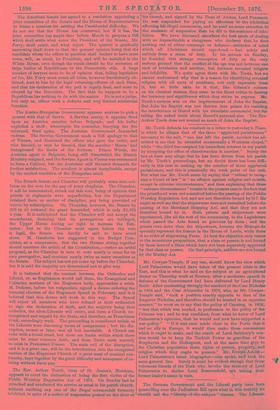The Rev. Arthur Tooth, vicar of St. James's, Hatcham, appears
to court the distinction of being the first victim of the Public Worship Regulation Act of 1874. On Sunday last he preached and conducted the service as usual in his parish church, without omitting any one of the illegal ceremonials formerly inhibited, in spite of a notice of suspension posted on the door of his church, and signed by the Dean of Arches, Lord Penzance. He was suspended for paying no attention to the inhibition affecting his illegal ceremonies, and he paid no more attention to the sentence of suspension than he did to the sentence of inhi- bition. We have discussed elsewhere the best mode of dealing with so impracticable a clergyman who declares that he does nothing out of either contempt or defiance—attitudes of mind which all Christians should reprehend — but solely and entirely from a sense of duty. In his sermon on Sunday, he founded this strange conception of duty on the very curious ground that the conflict of the age was not between one view of revelation and another, but between revealed religion and infidelity. We quite agree there with Mr. Tooth, but we cannot understand why that is a reason for identifying revealed religion with all sorts of accidents, not only separable from it, but so little akin to it that, like Gibson's colours on his classical statues, they seem to the finest critics to destroy the harmony and significance which they strive to express. Mr. Tooth's sermon was on the imprisonment of John the Baptist. But John the Baptist was not thrown into prison for resisting the interference of Herod with his ritualistic ceremonial, but for telling the naked truth about Herod's personal sins. The Rev. Arthur Tooth does not remind us much of John the Baptist.


































 Previous page
Previous page